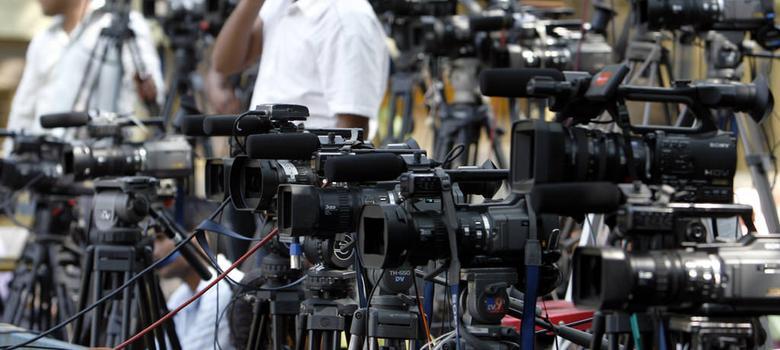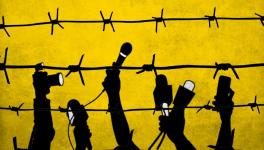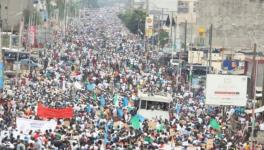On Suppressing Media, Judicial Verdicts and Undeclared Emergency

Representational Image. Image Courtesy: Reuters
A regime that targets journalists in particular and the press in general is usually called totalitarian. We could think up synonyms—authoritarian, dictatorial, etc.—but the first characterisation will serve. Welcome, then, to totalitarian India.
The latest batch of victims of the Modi-Shah duo’s ire has been a bunch of people who have focused attention on the farmers’ strike and the events that occurred on Republic Day in connection with the agitation. Apropos, too, is the Twitter spat.
Let us start with Mandeep Punia, the journalist who was arrested at the Singhu border on 31 January and released on bail on 2 February. The court observed while granting bail that a first information report (FIR) had been filed against Punia for his involvement in a scuffle that occurred seven hours after he was picked up, which was unusual. Besides, bail is the norm, and jail the exception in established jurisprudence.
Punia says he was just reporting on the events connected to the agitation for The Caravan, a magazine known for its investigative journalism, unlike vast numbers of pusillanimous publications that are only too happy to toe the lines drawn by India’s megalomaniac regime.
Prima facie there is more reason to believe Punia’s account than that of the Delhi Police, which, alongside its counterpart in Uttar Pradesh, is the most discredited law-enforcement agency in the country, kowtowing, as it does, to Union Home Minister Amit Shah. The Centre runs the Delhi Police by statute.
Delhi Police says Punia assaulted their officers. The actual reason for the detention, likely, is that Punia had accused Bharatiya Janata Party (BJP) cadres of attacking farmers, in the guise of residents, who were agitating in a Facebook Live session.
In this connection, we should recall the immortal statement of a former Allahabad High Court judge. In 1963, then Justice AN Mulla had said of the police: “...there is not, a single lawless group in the whole of the country whose record of crime comes anywhere near the record of that organised unit which is known as the Indian Police Force.”
Thus, Punia. The Caravan, which he was reporting for, has also been targeted with others in a separate, surreal case. FIRs have been filed by the Noida police against Congress Lok Sabha member Shashi Tharoor, senior journalists Zafar Agha, Mrinal Pande, and Rajdeep Sardesai, and three senior editorial employees of The Caravan for tweeting about a farmer’s death on Republic Day.
The substance of the tweets was that one Navreet Singh from Uttar Pradesh had died in police firing. The police claim that he had died of injuries resulting from an accident. The tractor he was driving had overturned after hitting a barricade, resulting in the injuries that caused his death. Post-mortem reports say there is no evidence of a bullet wound.
There are two points to be made here. First, the capacity of the central government and the Uttar Pradesh government, headed by a man to who subverts processes and suppress the truth has been in full sight for respectively almost seven and almost four years. The FIRs could well be a stratagem to protect the police.
Second, even if we concede that the impugned Member of Parliament and journalists were mistaken, the provisions made out against them are monstrous to the point of absurdity. They include sedition and the spreading of violence and disharmony. A bit thick is not it when the egregious Union Minister of State for Finance Anurag Singh Thakur is completely at liberty after provoking supporters to chant the Hindi equivalent of “shoot the traitors”?
It is he and his equally egregious comrade-in-arms Kapil Mishra, who chanted the same slogan and incited locals prior to the Delhi riots about a year ago, who should currently be cooling their heels behind a stout set of bars. The FIRs should not have been filed. Having been filed, they should be summarily quashed by the judiciary, if necessary suo motu.
Now let us get to the issue of Twitter and the suspension of internet and mobile services. First, India has emerged as the nation that has suspended internet services more than any other. In other words, India has been suspending internet services, especially since 2019, more than Russia, Turkey, Saudi Arabia, Pakistan, et al.
One presumes the current regime’s great ambition is to convert India into another failed or fake democracy.
In keeping with its uncontrollable reflex, it suspended internet and mobile services in the areas the farmers were protesting, even as it proceeded to build spiked walls to corral the agitators and prevented essentials from reaching them—including water and access to sanitation. The Modi regime is waging a war against farmers, but it does not want citizens—and the rest of the world—to know what it is doing.
Thankfully, apart from being a majoritarian, sectarian, obscurantist, and authoritarian regime, the dispensation led by Prime Minister Narendra Modi is also pathetically inept. Led from the front in terms of incompetence. That is why the world does know about the regime’s excesses.
That is what has prompted singer Rihanna, climate activist Greta Thunberg and others to tweet in solidarity with the farmers. And that, in turn, has prompted a puerile reaction from the Centre and, well, actor Kangana Ranaut, of whom no more.
This brings us to the Twitter spat. On 31 January, the Union government had ordered Twitter to block 257 URLs and one hashtag, “ModiPlanningFarmersGenocide”. Twitter initially complied but restored the blocked accounts and tweets within a few hours. It has now been threatened with penal action by the Modi regime but has persuasively argued that the government’s directives are disproportionate and impractical. Legal experts are saying there is no basis for the government’s demand.
What is obvious is that the government is prepared to go to any lengths to silence journalists and other critics—be they farmers encircling Delhi or Kashmiris protesting a long period of one of the harshest possible clampdowns this country has ever seen.
The attacks on the media by this regime, especially in Kashmir, has only one precedent—in the Emergency years. Thankfully that lasted just over a year and a half; this undeclared Emergency has been on for six. No discussion on the draconian proclivities of the current regime would be complete without a reference to Munawar Faruqui.
The stand-up comedian has been in jail since 1 January and denied bail thrice for something he might have said. He could rename himself Joseph K.
The police in BJP-ruled Madhya Pradesh have admitted they have no evidence of any crime. Meanwhile, on 28 January, the Madhya Pradesh high court had said that there was prima facie evidence to suggest that Faruqui had intended to outrage religious feelings “under the garb of stand-up comedy”. Justice Rohit Arya, who pronounced the judgment, had earlier said Faruqui “must not be spared”. Of what, one may ask.
Apart from attacking journalists and dissenters, this regime has done its utmost to undermine every possible institution and subvert all conventions. On 29 January, comedian Kunal Kamra said in an affidavit to the Supreme Court that there is a “growing culture of intolerance in the country, where taking offence is seen as a fundamental right which has been elevated to the status of a much loved national sport” and that “to believe any institution of power is beyond criticism … is irrational and undemocratic”.
The author is an independent journalist and researcher. The views are personal.
Get the latest reports & analysis with people's perspective on Protests, movements & deep analytical videos, discussions of the current affairs in your Telegram app. Subscribe to NewsClick's Telegram channel & get Real-Time updates on stories, as they get published on our website.
























